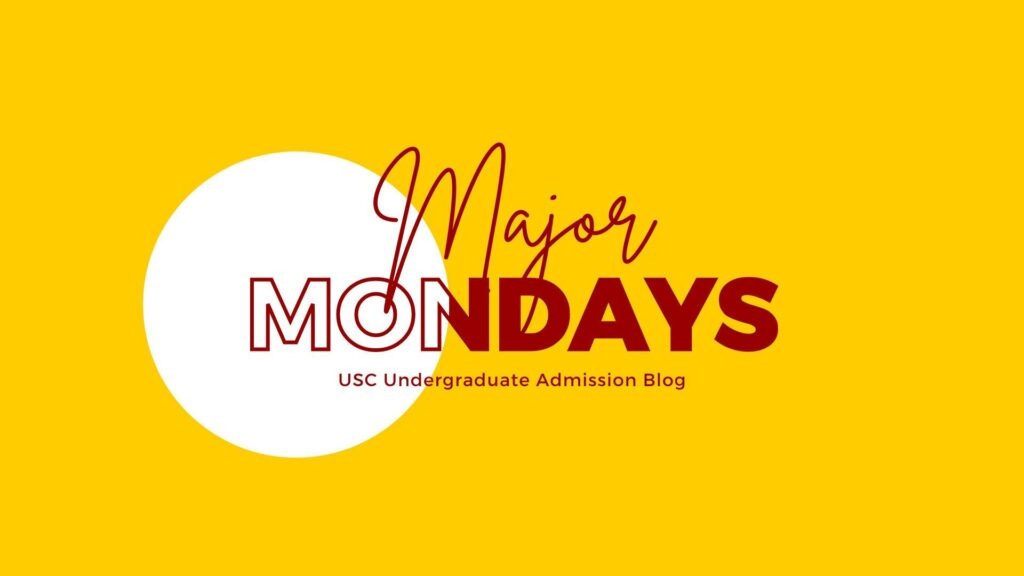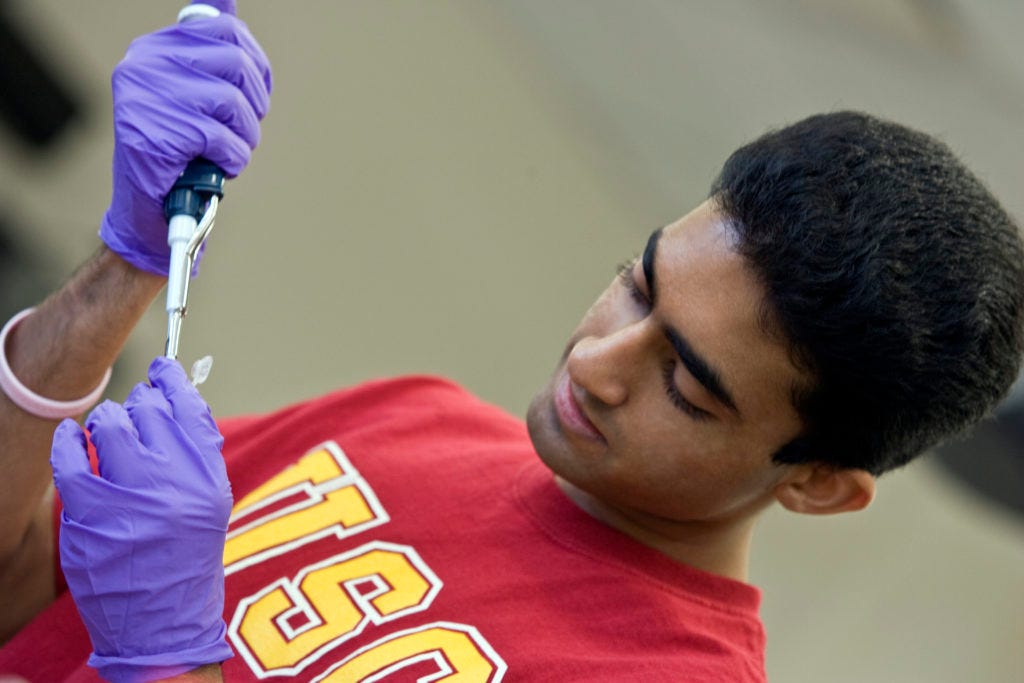Major Mondays: Chemical Engineering
One of my favorite things about USC is the academic diversity of our campus. I, myself, was a student at USC a while back, and despite being a film major, I often found myself in the company of engineering students – many of whom I am still friends with today. When the opportunity presented itself years later to learn a bit more about my friends’ major, I decided to dive in and write this blog post. I will give you Major Mondays: Chemical Engineering.
Major Overview: The Mork Family Department of Chemical Engineering & Materials Science within the USC Viterbi School of Engineering is home to the Chemical Engineering undergraduate degree, including six different emphasis programs: Biochemical, Environmental, Sustainable Energy, Polymer/Materials Science, Petroleum, and Nanotechnology. This major is open to prospective first-year and transfer applicants.
Current Student Perspective: The Viterbi Student Ambassadors (VSAs) produce some excellent content on their website, Viterbi Voices – including a blog and a podcast. In browsing their blog, I found so many great posts to read, but to help you narrow it down, I’ll highlight a couple posts here:
Why Chemical Engineering? – Sheetal writes about how while her interests and professional goals changed while she was in college, she stuck with chemical engineering because of how her classes and professors made her approach challenges. She writes, “Being a chemical engineer is about learning to view the world and its problems with an analytical mindset that aims, above all, to optimize a range of different, often complicated variables.”
The Necessity of a Good Study Group – Elena writes about the benefits of collaboration within the chemical engineering major and friendships she’s formed. She says, “Before coming to college, I knew that I wanted to study engineering in a supportive environment, and I found that in Viterbi. From doing homework to studying for exams and quizzes, I met groups of amazing people within my courses.”
The Choice: High School Senior to USC Trojan – Jacob writes about why he ultimately decided to attend USC to pursue chemical engineering. He writes, “I soon realized what USC offered that many other schools didn’t – the opportunity to have a college education and experience defined by more than just engineering.”
Research: Research is a top priority at the Viterbi School of Engineering, and is listed as such in their mission statement. Here are just a couple projects Viterbi students and faculty from the chemical engineering department are working on:
Cancer treatment: “A team of research students in the USC Viterbi School of Engineering Mork Family Department of Chemical Engineering and Materials Science has discovered how to build on CAR T-cell therapy to also stimulate production of an enzyme that can boost T-cells’ ability to attack and destroy solid cancers.”
Advanced Materials Research for Secure Communications: “USC Viterbi School of Engineering will lead a multi-institution center to develop new materials with applications in areas spanning secure communication, sensing, and memory and storage, thanks to $3.75M in Department of Defense funding support.”
You can find more information and a full list of Viterbi research centers on their website.
Outcomes: So, what will you actually end up doing with your Chemical Engineering degree? The Viterbi admission website lists some possibilities for you!
When you graduate with a degree in Chemical Engineering, here are just a few of the future career paths that might lay before you. Design and optimize cost effective ways to produce energy, drugs, plastics, and chemicals
Develop new biological and therapeutic agents
Establish new methods for chemical processing
Find solutions for environmental problems
Streamline petroleum exploration and refining
Create new consumer products and manufacturing systems
Regulate environmental health and safety standards
Production, design, development, and research in all fields that involve chemical changesAnd I couldn’t write this blog post without reaching out to the people that inspired me to write it in the first place. Two of the most notable USC “Chem E” alumni (in my opinion):
Daniel Harris, USC class of 2009: After graduating with a bachelor’s degree in Chemical Engineering from USC, Dan went on to earn his PhD in Materials Science and Engineering from MIT. He is an author on 14 academic papers and an inventor on three patents. Dan currently works as the VP of Pharmaceutical Development and CMC at Lumicell. He says that Viterbi’s “coursework and research opportunities set me up for success in graduate school and I use what I learned every day in my job overseeing pharmaceutical manufacturing at a startup.”
Nicholas Wright, USC class of 2012: Nick earned his bachelor’s degree in Chemical Engineering from USC and recently graduated from UT Austin with his MBA. He now works as a Business Operations Associate at Tesla. He sent the following thoughts on his time as an engineering student at USC and how it’s impacted his work today:
“The more applicable and longer lasting knowledge I gained at Viterbi has been in how I approach and structure my process for solving problems. Learning to think systematically and apply a defined structure to problems has been an invaluable tool in my career. Of course not all problems can be solved with a one-size-fits-all approach and it is at Viterbi where I first figured out, not only how to structure my process, but also when to adapt and try something new (and have the confidence to fail and learn from it too!).
Honestly earning my degree in ChemE was hard (I do not want to sugar coat it). There was lots of calculus, chemistry (obviously), and engineering classes that pushed me to my limits. I made many great friends in my classes though as it was only through them and our many late night study sessions that I was able to get all the concepts we covered over 4 years. Ultimately I’m glad I pursued ChemE because I love the subject (honestly) and I learned a lot about myself and what I am capable of. I remember especially loving the Solid State Processing & Integrated Circuit lab class. You get to spend time in the clean room facility as part of the class and it was pretty inspirational to see concepts we learned in the classroom be directly applied to a lab project with real world applications.
While I admittedly no longer use my knowledge of chemical reactor design or multi-variable calculus in my work I am still glad I did my undergraduate work in ChemE. The study habits I developed as an undergrad paid off immensely when I got my MBA and helped me land my current role. Being at a very engineering heavy company I find my background to be extremely useful. It not only gives me a sense of belonging when I am meeting with other engineers of various disciplines, but it helps me communicate and understand their struggles and needs. My Chem E degree comes in handy every day as it allows me to be the finance staff member who can speak both discipline’s “language” and bridge a gap that can otherwise feel quite wide.”
In conclusion, thank you for giving me the space to brag about my USC friends!
Want to Learn More?
If you want to learn more about Chemical Engineering at USC, check out the resources below:
Viterbi Admission Chemical Engineering Website
Viterbi Voices: They have a blog, a podcast, and a virtual tour video!
Follow the Viterbi Student Ambassadors and the Viterbi Admission accounts on Instagram.
Watch the Faculty Roundtable about Chemical Engineering on YouTube.
Register for a virtual info session with Viterbi.
Written by: Hayley Camin, former Associate Director - USC Office of Admission
Edited by: Nancy Ohia, Assistant Director - USC Office of Admission


